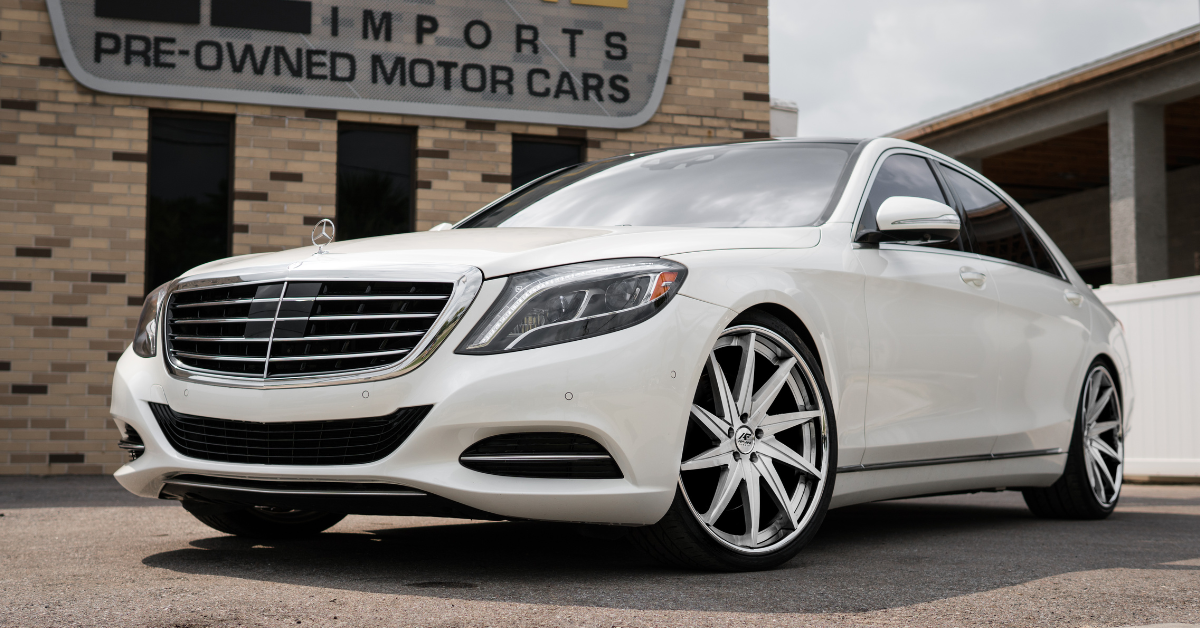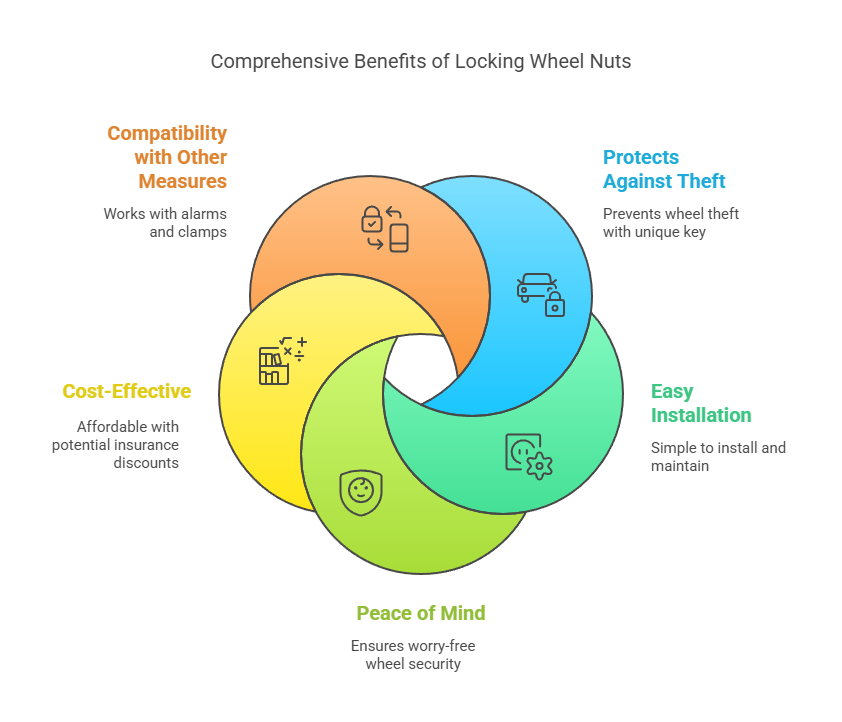JOIN THE B2B PORTAL
Become a dealer and get access to our exclusive online B2B platform for the best value on Elite Wheel and Tire brandS.
Blog

Do New Cars Come With Locking Wheel Nuts? Yes. Some new cars come with locking wheel nuts, but not all of them. Many high-end brands include them in their vehicle, whereas budget-friendly ones don’t. Locking wheel nuts protect expensive, premium wheels from theft, saving you money and hassle. These nuts keep your wheels safe, giving you peace of mind.
Alloy wheels are a common target for thieves. These nuts add an extra layer of security need a special key to remove the lock. While these nuts may not be theft-proof, they make stealing wheels difficult, discouraging thieves from even trying.
Not all cars come with locking wheel nuts, but you can easily buy a set for added security. It’s a small cost for a big upgrade! And while you’re at it, why not pair that safety with style? Check out Elite Wheels Warehouse for top-quality options that keep your ride looking as good as it’s protected. After all, your car deserves nothing but the best!
Locking wheel nuts, or wheel locks, are specially designed lug nuts that secure your wheels. They require a speial key to remove them. Each nut has a one-of-a-kind pattern, so a standard wrench won’t work. They work by replacing one lug nut per wheel with a locking version. You need the matching key to remove it, which fits perfectly into the unique grooves. Made from hardened steel, they’re tough to break or tamper with. Simple yet effective, they add an extra layer of wheel security. Just don’t lose the key. You’ll need it for tire changes.
| Feature | Standard Lug Nuts | Standard Lug Nuts |
|---|---|---|
| What They Are | Regular nuts that secure wheels to the car | Specialized nuts with a unique design that require a matching key for removal |
| Design | Simple, uniform shape | Unique pattern, often with grooves or ridges |
| Removal Tool | It can be removed with a standard lug wrench | Needs a specific locking wheel nut key |
| Security | Basic security holds wheels in place | Extra security prevents unauthorized wheel removal |
| Cost | Low-cost, usually included with most cars | Slightly more expensive, typically $20–$100 per set |
| Maintenance | Minimal. Just ensure they are tightened properly | Requires keeping track of the locking key and checking for wear |
| Best for | Everyday cars, budget-friendly vehicles | Cars with alloy wheels, high-theft areas, or added security needs |
No. Not all new cars come with locking wheel nuts as standard. Many manufacturers include them, especially on luxury cars, performance vehicles, and models with alloy wheels, since these wheels are often targeted by thieves. Brands like BMW, Audi, and Mercedes-Benz commonly equip their cars with locking wheel nuts for added security.
However, entry-level cars, budget-friendly models, and vehicles with steel wheels may not have them, as these wheels are less valuable and less likely to be stolen. If your car doesn’t come with locking wheel nuts, you can always purchase a set separately to improve your wheel security.

Locking wheel nuts may seem like a small addition, but they play a big role in keeping your wheels safe. Here’s why they’re an excellent investment for car owners.
Wheels, especially expensive alloy ones, are a common target for thieves. Locking wheel nuts requires a unique key, making it much harder for someone to remove them without the right tool.
They’re simple to install, work with almost all wheel types, and don’t require any maintenance. Once they’re on, you can pretty much forget about them until you need that extra security.
Knowing your wheels are secure means you won’t have to worry about waking up to a car sitting on bricks. It’s a small investment that saves you from expensive replacements and stress.
Replacing stolen wheels can cost a fortune, but locking wheel nuts is a one-time, affordable investment. Plus, some insurance companies offer discounts for cars with added security features. It’s a win-win for your wallet!
Locking wheel nuts can be combined with car alarms, wheel clamps, or secured parking for even better protection. They’re an easy first step in keeping your vehicle safe.
To check if your new car has locking wheel nuts, start by inspecting the wheels. Look closely at each wheel. If one nut has a unique pattern or shape different from the others, it’s likely a locking wheel nut. Unlike regular lug nuts, these have an irregular design, which requires a special key for removal.
Another way to check is by looking inside your glove box, trunk, or spare tire compartment for a locking wheel nut key. You will find a small metal tool designed to fit the unique pattern of the locking nut. You can also refer to your owner’s manual or ask your dealer to confirm if your car includes them.
If your car doesn’t have locking wheel nuts, don’t worry. You can always purchase a set separately. Locking wheel nuts is an inexpensive and easy addition that can provide extra protection for your wheels.
That’s it! Keep your key in a safe place (like your glove box) to remove the nuts when needed.
Locking wheel nuts are great for preventing wheel theft, but they’re not the only option. Here are some simple alternatives to keep your wheels safe
These big, visible locks wrap around the wheel, making it impossible to drive. They’re great for long-term parking but not the most convenient for daily use.
These disguise your lug nuts, making it harder for thieves to remove them. While they don’t lock the wheels, they add an extra challenge.
These look like regular lug nuts but have unique designs that require special tools to remove, making theft much harder.
These detect movement near your car, sounding an alarm if someone tries to remove your wheels.
Locking wheel nuts protects your wheels, but proper care prevents issues. First, store the locking key safely in your glove box, trunk, or with the spare tire for easy access.
Check and tighten the nuts every few months, as road vibrations can loosen them. Avoid over-tightening, which can damage the pattern use a torque wrench for proper fitting.
Keep them clean by gently scrubbing off dirt and grime with a soft brush and mild cleaner. Apply a small amount of anti-seize lubricant to prevent rust and ensure smooth removal. It prevents rust and corrosion.
Lastly, keep a spare key in a different location in case the original is lost. With these simple steps, your locking wheel nuts will stay secure and hassle-free.
Locking wheel nuts offers big protection for a small cost. Whether your car comes with them or you install them yourself, they add an extra layer of security, especially for alloy wheels or in high-theft areas. They’re affordable, easy to maintain, and offer peace of mind knowing your wheels are safer.
While not theft-proof, they’re a strong deterrent that makes your car a less likely target. For new car owners, locking wheel nuts are a smart, simple upgrade that’s well worth the effort. Check out Elite Wheels for quality wheels, expert advice, and the best selection, and drive with confidence!
Answer: You can find your locking wheel nut code in your car’s manual, service book, or on a sticker in the glove box or trunk. If missing, check with your car dealer or manufacturer for a replacement.
Answer: Yes, installing locking wheel nuts is simple and can be done at home with basic tools like a lug wrench and jack. Just replace one standard lug nut per wheel with a locking one.
Answer: If you lose the key, contact your car’s manufacturer or a professional locksmith. They can help remove the nuts and provide a replacement key.
Become a dealer and get access to our exclusive online B2B platform for the best value on Elite Wheel and Tire brandS.
“We strive to be the global leader in the automotive industry with brands built on passion, inspiration, and innovation.”